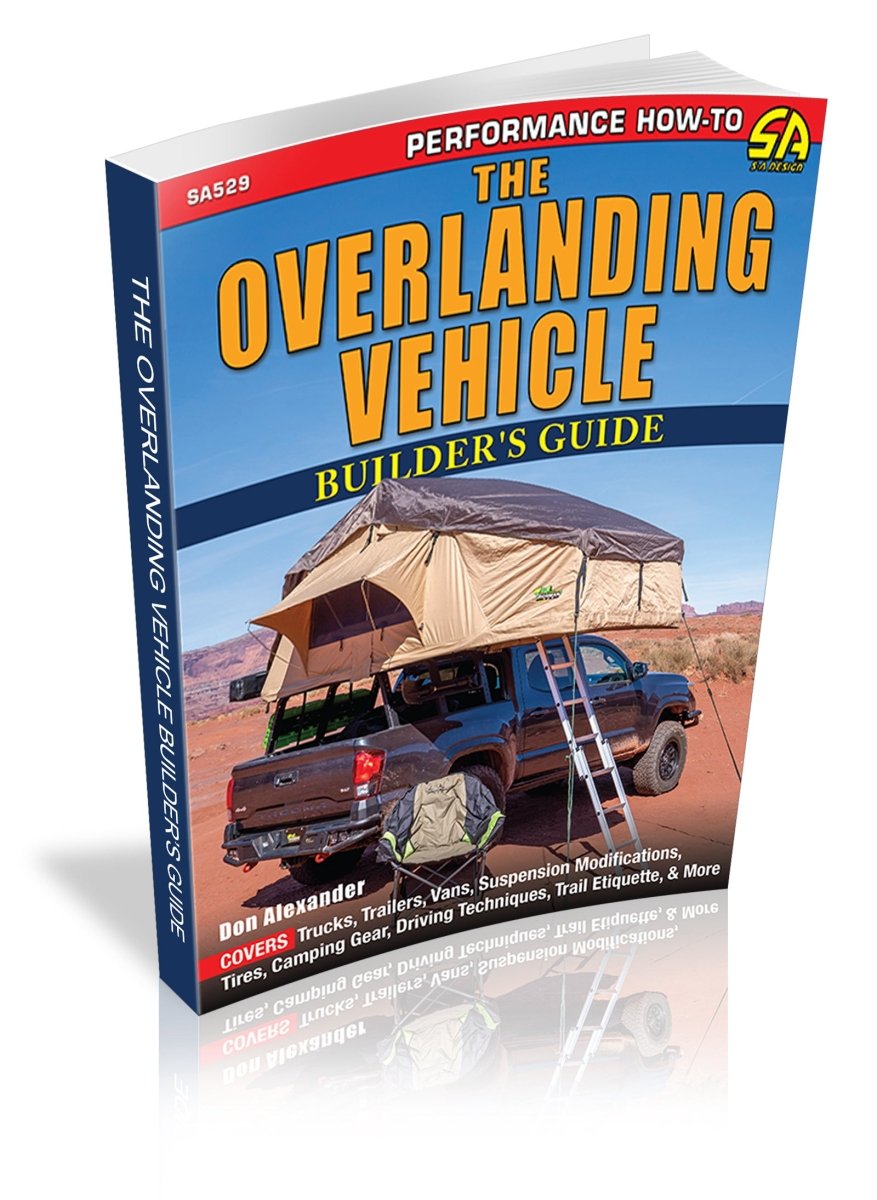
What is overlanding? Wikipedia states, "Overlanding is self-reliant overland travel to remote destinations where the journey is the principal goal. Typically, it is accomplished with mechanized off-road-capable transport (from bicycles to trucks) where the principal form of lodging is camping. It often lasts for extended periods of time (months to years) and spans international boundaries."
Overlanding did not originate in America, and it is a little different here. You would be hard-pressed to find a bicycle out in the desert, and most people don’t go overlanding for quite that long. However, the spirit of the activity is the same.
Do you want to give overlanding a try? Great! You will need some gear.
In The Overlanding Vehicle Builder’s Guide, veteran racer, off-roader, and journalist Don Alexander provides a terrific overview of what to consider when building your overlanding rig. This includes the planned duration of the trip, the number of people in your party, how far off the beaten path you want to go, and the creature comforts you require.
Understanding those wants and needs shapes what gear you need for the best experience. Covered are the strengths and weaknesses of the types of vehicles themselves, modifications to the vehicles to make them more capable, accessories (lighting, camping gear, food and water storage, etc.), and equipment for trail mishaps and recovery. Driving techniques and trail rules and etiquette are also included.
If you are ready to build a rig or just want to know more about the hobby, this book is a great guide to help you get started.
Pages : 176
Size : 8.5 X 11 (inches)
Format : Paperback / softback
Illustrations : 448 color photos
Publisher : CarTech
ISBN : 9781613257487
Product Code : SA529
Acknowledgments
Introduction
Chapter 1: What Is Overlanding?
The Freedom to Explore, Responsibilities, and Consequences
Dispersed Camping
Leave No Trace
Chapter 2: Overlanding Vehicles
Important Questions
4WD versus AWD
Solid Axle versus Independent Front Suspension
Roof Weight-Bearing Capacity
Brands and Models
Chapter 3: Overlanding Newcomer Tips
Driving Tips
Vehicle Tips
Gear Tips
Other Tips
Chapter 4: Overlanding Trailers, Adventure Vans, Truck-Bed Campers, and Expedition Rigs
Trailers
Adventure Vans
Truck-Bed Campers
Expedition Rigs
Chapter 5: Building an Overlanding Rig
Determine the Type of Overlanding that You Prefer
Cause and Effect
Build Options
Chapter 6: Suspension, Steering, and Brakes
Suspension Components
How Suspension Works
Solid Axle versus Independent Suspension
Steering
Brakes
Chapter 7: Tires and Wheels
Selecting the Best Tire Type
Off-Road Tire Design Features
What Type of Off-Road Tire Is Best for Your Specific Needs?
Optimal Tire Size
Tire Pressure
What Off-Road Tires Need to Do
How to Measure for Optimal Sidewall Heights and Tire Pressures
Off-Road Tire Pressures
Options for Airing Down Tires
Tire-Pressure Deflators
Deflators, Replacing Valve Stems, or Adding a Second Valve Stem
Tire-Pressure Gauges
Reinflating (Airing up) Tires
Onboard Air Compressors
Compressed CO2 Systems
Multi-Tire Inflation/Deflation Systems
Wheel Specifications
Chapter 8: Vehicle Protection
Potential Hazards
Skid Plates
Rock Sliders
Bumpers
Chapter 9: Electrical Accessories, Electronics, and Lighting
Auxiliary Switch Solutions
Auxiliary Lighting
Radio Communication
Satellite Messengers
GPS and Smartphone GPS Applications
Electronic-Calibration Modules
Batteries and Jumper Batteries
Inverters
Power Sources/Power Stations
Battery Isolators and Monitoring Systems
Generators
Solar Panels
High-Output Alternators
Estimating Electrical Power Needs
Chapter 10: Vehicle Recovery Gear, Winches, and Trail Tools
Recovery Tools
Multi-Use Tool Kits
Winching Tips, Tricks, and Techniques
Road Building
Winter Recovery
Chapter 11: Engine and Driveline Upgrades
Engine Upgrades
Automatic Transmission Coolers
Cooling System
Drivelines
Ring-and-Pinion Gear Upgrades
Front Axle Shafts
Rear Axle Shafts
Selectable Axle Lockers
Limited-Slip Differentials and Detroit Lockers
Driveshafts, Yokes, CV Joints, and U-Joints
Full Axle Assembly Swaps for Solid-Axle-Housing-Equipped Vehicles
Chapter 12: Overlanding Adventure Accommodations
Rooftop Tents
Ground Tents
Awnings
Privacy Shelters
Annex Rooms
Portable Toilets
Portable Showers
Sleeping Bags
Ground Covers and Cots
Chapter 13: Gear Storage, Food Storage, and Preparation Gear
Refrigerators
Ice Chests
Water Tanks and Pumps
Slide-Out Drawers
Storage Bags
Hard Storage Cases
Stoves, Griddles, Barbecues, and Skottles
Propane Tanks and Mounts
Kitchen Gear
Chapter 14: Fluid Storage, Tools, and Medical Items
Fluid Storage
Tire Repair Kit
Tools and More
Chapter 15: Driving Tips and Tricks
Using the Controls
Climbing Hills
Descending Hills
Chapter 16: Passage Through Tough Terrain
Spotting Rules
Verbal Communication and Verbal Commands
Hand Signals
Spotting Tips
Driving Tips

